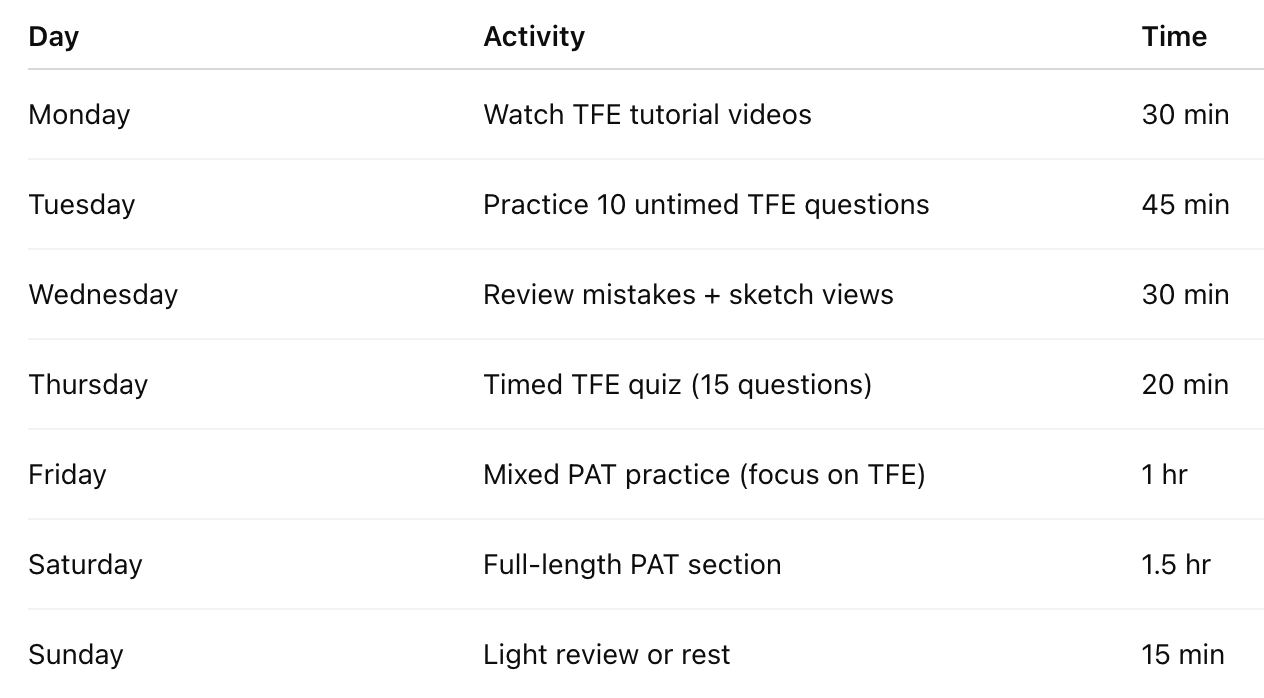The Ultimate Guide to the Top-Front-End Section of the PAT
Everything You Need to Know to Master the TFE Questions on the DAT
Struggling with the Top-Front-End section of the PAT on the DAT? This ultimate guide breaks down how to approach TFE questions with step-by-step strategies and practice tips to help you boost your score.
If you’re preparing for the Perceptual Ability Test (PAT) on the Dental Admission Test (DAT), there’s a good chance the Top-Front-End (TFE) section has left you confused or frustrated. For many pre-dental students, TFE is one of the most intimidating PAT subsections—but with the right approach, it can become one of your biggest strengths.
In this ultimate guide, you’ll learn:
What the TFE section actually tests
The biggest mistakes to avoid
A proven strategy to decode TFE questions
Practice tips and tools to sharpen your skills
🔎 What Is the Top-Front-End Section?
The TFE section presents a 3D object represented by three orthographic views:
Top view
Front view
End (side) view
Your job is to mentally reconstruct the 3D shape from these 2D views and determine if the given answer choices match the object.
There are 15 TFE questions on the PAT, and success requires strong spatial reasoning and visualization skills.
🧠 What Is the TFE Section Testing?
3D visualization from 2D representations
Ability to mentally rotate and reconstruct objects
Attention to spatial details like hidden surfaces and depth
Working memory under time pressure
These are the same kinds of skills you’ll use in clinical dentistry when analyzing radiographs, working in confined spaces, or interpreting models and impressions.
⚠️ Common Mistakes Students Make on TFE Questions
Many test-takers struggle with TFE due to:
Trying to memorize shapes instead of understanding how views work
Overlooking depth cues, like line types and shading
Confusing orthographic projections with isometric views
Skipping practice because “it’s too hard”
The truth is, you can train your brain to handle TFE—you just need the right tools and approach.
✅ Step-by-Step Strategy to Master the TFE Section
Here’s a five-step strategy high-scoring students use to dominate TFE questions:
Step 1: Understand What Each View Represents
Top View: Bird’s eye view—shows depth (front-to-back) and width (side-to-side)
Front View: What you’d see facing the object—shows height and width
End View: Usually a right-side view—shows height and depth
Memorize which views show which dimensions. This is crucial.
Step 2: Use Line Types to Spot Depth
Solid lines represent visible edges.
Dashed lines represent hidden edges.
Dashed lines are your best friend—they tell you about internal or obscured features that aren't immediately obvious.
Step 3: Reconstruct the 3D Object Mentally
Don’t just passively observe the views—actively sketch or imagine the 3D object.
Start with simple blocks and extrusions.
Then, add cutouts, holes, or indentations based on the dashed lines.
This skill takes time, so be patient and consistent.
Step 4: Compare Answer Choices by Eliminating Inconsistencies
Use the process of elimination.
Rule out any choices with extra or missing features when compared to the given views.
Watch out for:
Inverted or flipped pieces
Incorrect depth dimensions
Mirrored shapes
Step 5: Time Yourself Only After Building Accuracy
Start by solving TFE questions untimed.
Once you're consistently accurate, begin incorporating a time limit of 1 minute per question.
Build up to solving full-length TFE sections under test conditions.
🔁 Visualization Drills for Better TFE Skills
To improve your spatial reasoning, practice:
Drawing 3D shapes from 2D views and vice versa
Using graph paper to sketch orthographic projections
Assembling simple 3D puzzles or building blocks
Using apps or software like GeoGebra, CAD, or Google SketchUp
🧰 Best Resources to Practice TFE Questions
Here are the most effective tools trusted by top scorers:
DATBooster PAT Generator – Excellent TFE visuals with high-yield explanations
DAT Bootcamp PAT Academy – Strong video instruction for TFE and spatial skills
PATCrusher – Great analytics and question bank for TFE-specific drills
YouTube Channels – Search for “Top Front End PAT walkthrough” for visual guides
📆 Sample Weekly TFE Practice Plan
🦷 Final Thoughts: You Can Train for TFE Success
TFE might feel overwhelming at first, but like any other PAT section, it's a learnable skill. With the right strategy, consistent practice, and visualization training, you'll be amazed at how much progress you can make—even in just a few weeks.
Need Help with TFE or Other PAT Sections?
At Dental School Declassified, our tutors are dentists who scored in the 98th percentile or higher on the DAT. We offer:
1-on-1 PAT tutoring (including deep dives into TFE)
Custom study plans based on your strengths and weaknesses
Strategy coaching for time management and accuracy
